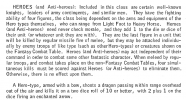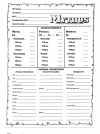redlemonginger
Well-Known Pubber
- Joined
- Jun 19, 2021
- Messages
- 82
- Reaction score
- 203
Fate Core, DND 3.5, Dnd 5E, Dungeon World, Fate Accerated, Savage Worlds, Barbarians of Lemuria, Everywhen, End of the World, Genesys, BRP, Symbaroum, New World of Darkness, Shadow of the Demon Lord, Dread, Dark Heresy, Stars Without Number, Pathfinder 2e, Pathfinder, and some more that I can't think of without looking at my bookshelf.Fair enough, perhaps you could list them. I've played many a game, and none really did it for me completely so made my own...and my own never did for me completely until about 6 years ago. As to "tough" choices in combat it can be more in tactical and how much you want to help keep someone else alive at risk to your self...and in my own there are a few tactical maneuvers that give you extra dice (I use counts success mechanics) but with limitations or costs so that is the tough choice. The speed and unknown in these combats provides drama and excitement as the enemy also uses tactics and getting surrounded or cut off can mean death. But granted combat is, it's means and ends, is not everyones cup of tea. As a GM I can revel in the players use of tactics, that surprise me and help them overcome odds that appear daunting.
I too find NPC interactions to be some of the most fulfilling part and good ones intellectually stimulating, I also love a good haggle. Yes as GM this is the best as get to bring forth and use all that "narrative sandbox" pre work. Alas as a GM I never feel I have any tough choices.
I personally am not a fan of investigation or mystery games, not that I dislike the genre just it takes a very, very good writer for me to enjoy a mystery (so guess I don't love he genre) ...hard for me to not find it contrived and hard for me to buy the logic of the writer which is often not much more than assumptions based on stereotypes. Given that I don't really try my hand at these and any hidden clues (which I use a lot) are just icing on the cake for diligent PCs or those who built characters with info gathering in mind...which I make players well aware of the value of such skills in my games....and to many players shock it is actually true (I get that so many D&D games have been in said it was so but it never was), hence why I often allow a little bit of after the fact character re-design for new players.
I made a video a while back on my favourites:
Barbarians of lemuria is my top game at the moment. I definitely prefer the light side of medium crunch.
I'm the same way. I still haven't found "my game" yet. I might make it eventually, but so far I've had no success.









 ?
?
 .
.
